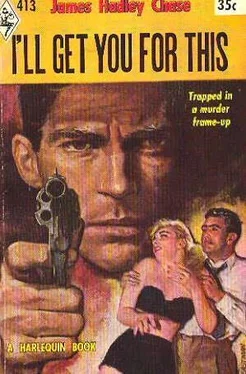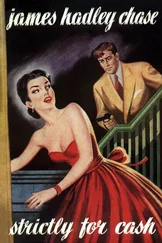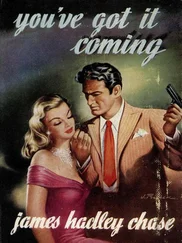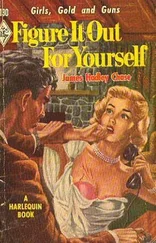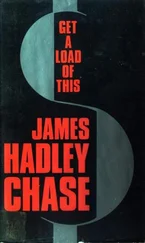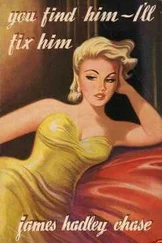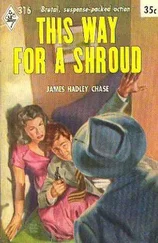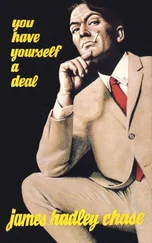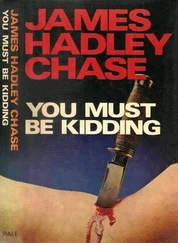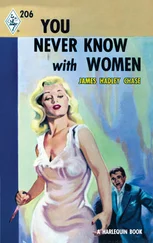“Hello.” I said, smiling at them. “How are you liking the circus ?
The man was tall and beefy with a red face and a military moustache. His eyes were hard and stupid, his neck thick. The woman was a dark, nicely moulded trick in an interesting Grecian affair—black crepe with gold bands crossed high on the bodice and double gold bands around the hem. She was about thirty-five, and there was a wordly look in her slaty eyes that I like to see in women of thirty-five.
The red-faced guy stiffened his backbone after the first shock of seeing me had passed. He growled deep in his throat, started a ponderous swing that a battleship could have dodged.
I let the swing sail over my head and ruin a lot of air in the passage. Then I pushed the Luger into his fat ribs.
“Skip it,” I said. “You’d be better at the ballet.”
His red face went a waxen white.
I looked at the woman. She hadn’t turned a hair. She looked back at me, her eyes interested, unafraid.
“Think of the fun you’ll have telling your friends,” I went on to the man. “Chester Cain passed this way. You could even put a plaque on the outside of the house.”
They didn’t say anything, but the man had difficulty in breathing.
“Would you both go into one of these rooms?” I said, jerking my head to a line of doors. “I’m as harmless as a spinster aunt so long as no one crowds me.”
I manoeuvred them into a front room, made them sit down. The furniture was as heavy and as dull as the man’s face. The woman continued to eye me with interest.
I put my gun away to ease the atmosphere, peered out of the window.
Searchlights roamed the sky, car lights lit up the street, flat caps moved back and forth.
“I’ll stick around,” I said, sitting down so I could watch the two. “That reception committee still looks like business.” I lit a cigarette, then remembered my manners, offered the pack to the woman. She took one, giving me a long, curious stare as she did so.
“Jill!” the man spluttered. “What the hell do you think you’re doing?”
“Why shouldn’t I smoke?” she asked in a tired voice.
He opened and shut his mouth, then scowled at her.
I struck a match and lit her cigarette. I had an idea at the back of my mind that I might have fun with her.
We sat around while the cops tramped up and down, poked into bushes and scared hell out of each other.
Maybe the red-faced man thought I was harmless without my gun in my hand, maybe his manhood nudged him. He suddenly bounded out of his chair and came at me like a charging rhino.
I had my gun out by the time he arrived, but he was coming so fast he hadn’t time to apply his brakes. I cracked him on top of his skull and he stretched out on the carpet.
“I’m sorry,” I said to the woman. “But you saw how it was.”
She looked down at the mountain of flesh without a great show of interest or distress.
“Have you killed him?” she asked.
She sounded as if she hoped I had.
I shook my head. “No.”
“He won the Purple Heart,” she said, looking at me. “I wonder if you know what that means? He likes to explain the battle to people.”
“You mean he moves the salt cellar and the spoons and the pepper-box, and shows dispositions, manoeuvres and advances?”
“That is the general idea,” she said, lifting her elegant shoulders.
I looked down at the red-faced man and thought she couldn’t I have much fun with him.
“Yeah,” I said. “These boys who live in the past are hard to take.”
She didn’t say anything.
A double knock on the front door brought me to my feet.
“That sounds like the Law,” I said, twirling the Luger.
“Are you scared?” she asked, staring at me. “I wouldn’t have thought anything would scare you.”
“You’d be surprised,” I returned, grinning. “Spiders give me goose pimples.” I opened the room door. “Come on,” I said. “I want you to talk to the Law. You won’t throw an ing-bing?”
“No, I won’t do that,” she said. “I suppose if I tell them you’re here, you’ll shoot me?”
I shook my head. “I’ll have to shoot the coppers, and that’d be a shame,” I said.
We went down the passage to the front door. I stood against the wall in the shadows where I could see without being seen.
“You don’t want to be told what to say, do you?” I asked.
“I don’t think so,” she said, opening the door.
There were a couple of cops standing on the front step. When they saw her they saluted.
“Everything okay, Mrs. Whitly?” one of them asked. His voice was loaded with respect.
“Except the noise,” she said calmly. “Is it necessary to shoot so much? Surely one man can’t be as dangerous as you make him sound.”
“He’s a killer, ma’am,” the cop said, breathing heavily. “The Lieutenant’s not risking lives. We shoot first and talk after.”
“Very interesting,” she said, in a bored voice. “Well, I hope it stops soon and I can go to bed.”
“We’ll catch him, ma’am,” the cop said, sticking out his chest. “But don’t worry, we reckon he’s some way from here by now.”
She closed the door, and we stood in the dim light, listening to the cops as they pounded their way up the street.
She fingered a ruby and gold bracelet, glanced at me.
“Is that Mr. Whitly?” I asked, jerking my thumb in the direction of the room we had just left.
She nodded. “Charles Whitly, the son of John Whitly, the millionaire,” she said, in a hard, toneless voice. “We are very respectable people, and even the police salute us. Our friends are very respectable too. We own three motor-cars, six racehorses, a yacht, a private beach, a library of expensive books that no one reads, and lots of other very expensive and useless things. My husband plays polo…”
“And he won the Purple Heart,” I said, shaking my head. “It sounds wonderful.”
Her lip curled. “It does. It was when I married him.”
“Yeah,” I said. “Well, it isn’t my idea of fun.”
“It hasn’t turned out to be mine either,” she said, examining the bracelet.
We could go on like this all night, so I opened the front door. I guess I’ll be running along,” I said. “I enjoyed meeting you, and I’m sorry about the expensive things, and I’m sorry about hitting your husband on the head.”
“Don’t be sorry about that. It’ll give him another topic of conversation,” she said, and swayed towards me.
“I’m still sorry,” I said. Our faces were close.
“You don’t find life dull, do you?” she asked. I put my arm around her and kissed her. We stayed like that for a minute or so, then I pushed her gently away.
“Life’s fine,” I said, and went down the steps of the house. I didn’t look back.
I ran the Mercury convertible into the wooden garage next to Tim Duval’s place on the waterfront. I cut the engine and the lights, shut the garage doors and walked over to the house.
Searchlights still waved over Paradise Palms. Maybe they thought I was hiding in the sky. Every now and then a nervous cop would let off his gun. The activity was now a couple of miles away, and right where I was seemed quiet enough.
I rapped on the door of the squat, faded house and waited. There was a long pause, then a woman’s voice called from an overhead window, “Who is it?”
“Tim around?” I asked, stepping back and peering at the white blob that looked down at me.
“No.”
“This is Cain,” I said.
“Wait,” the woman said, and a moment or so later the front door opened.
“Where’s Tim?” I asked, trying to see the woman in the darkness.
Читать дальше
